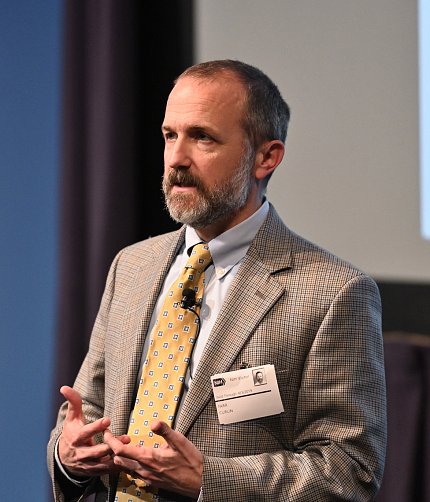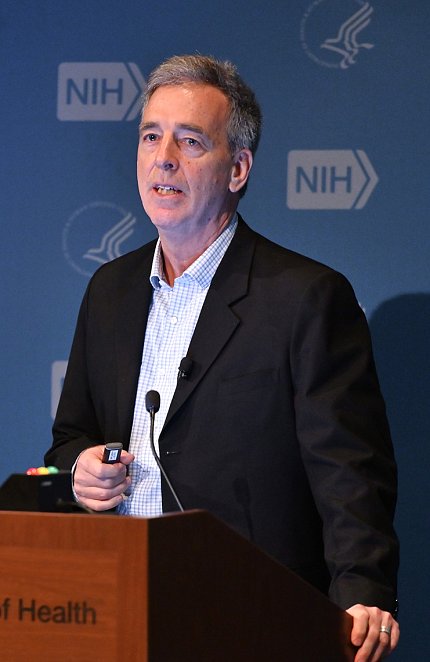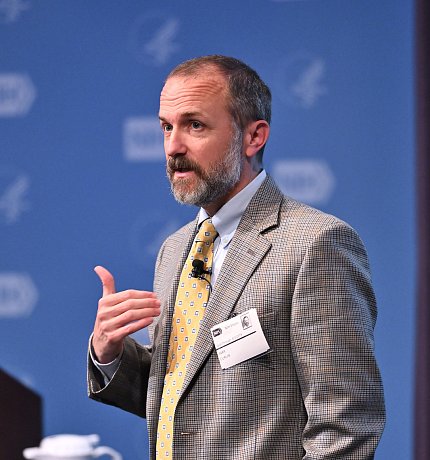Curlin Presents Alternative View of Patient-Clinician Dialogue

Photo: Marleen Van Den Neste
As the Clinical Center buzzes with everyday activity, there sometimes comes that snag clinicians face while informing a patient that his or her chosen course of treatment is not the best one, even though the patient consented to it. A recent CC Ethical Grand Rounds talk hosted by Dr. David Wendler, senior investigator and head of the section on research ethics in the hospital’s department of bioethics, addressed the dilemma faced by clinicians trying to change a patient’s informed decision. The situation is even more complex when the decision is based on a patient’s religious beliefs.
To get an idea of how unusual some informed choices seem to a clinician, consider the case of BB, a woman with three grown children, plenty of friends and an active social life even after twice overcoming cancer. BB visited the Clinical Center when her cancer came back for a third time and had metastasized. The oncologist gave her three options. One, a phase-3 clinical trial that had shown promising results in many patients; two, a phase-1 clinical trial that was in its earliest stage and was predicted to be very toxic to BB; and three, symptomatic treatment at home, which meant enjoying her remaining days without any remedial intervention.
BB chose option two. She said that having fully understood the implications of a new and untested clinical recourse, she felt, as a devoutly religious individual, that God was looking out for her and that she wouldn’t experience the potential side-effects of the phase-1 medication. The perplexed oncologist, who happened to be an atheist, contacted the bioethics team for help.

Photo: Marleen Van Den Neste
Modern ethical norms of clinical trials tend to be straightjacketed by boundaries of physician practice. There is emphasis that a physician must be competent to understand a patient’s choice, should never infringe upon the patient’s autonomy in choosing a treatment and be neutral towards his or her own and the patient’s spiritual beliefs.
“Because of these concerns, physicians are generally discouraged from crossing over this boundary between religion and medicine,” said guest speaker Dr. Farr Curlin, the Josiah C. Trent professor of medical humanities, palliative medicine specialist and ethicist at Trent Center for Bioethics, Humanities & History of Medicine at Duke University Divinity School.
“Over the past half century, multiple movements have emphasized that patients’ experiences of illness are shaped by their particular histories and cultures,” said Curlin. Likewise, “clinicians are trained to resist the undue influence of their so-called personal values.” However, this conventional narrative doesn’t always describe the reality.
Most physicians are wary of discussing spiritual matters with their patients and actively avoid such issues when brought up by the patient, according to studies conducted by Curlin and his colleagues. But those few who did cross the boundary from the logical and impersonal landscape of medical science into the reflective and personal realm of religion found the experience to be deeply rewarding.
Patients have not only been responsive but also appreciative and grateful for having religious or spiritual discussions with their caregivers, even if they did not share the same religious belief, Curlin and his colleagues observed in an inpatient study at the University of Chicago. Even those who did not actively seek spiritual discussions, but were somehow led into it, found their hospitalization experience more satisfying than those who did not have such discussions at all.

Photo: Marleen Van Den Neste
After years of experience as a palliative care practitioner and ethicist, Curlin advises physicians to disregard the medicine-spirituality boundary in doctor-patient dialog. He observed that current norms emphasizing competence, autonomy and neutrality are only fitting if discussions about spiritual concerns are some form of “technique” applied by one stranger to another.
Better norms, he suggested, are wisdom—which develops with experience and is shown in good clinical judgment; respect—which is shown in taking a patient seriously; and candor—which means being honest about disagreements. These norms fit conversations governed by solidarity between the patient and physician.
Finally, says Curlin, “Once you have concluded that there are a number of reasonable ways forward that you’d support, you’ve got to respect the patient’s authority to choose among them.”
